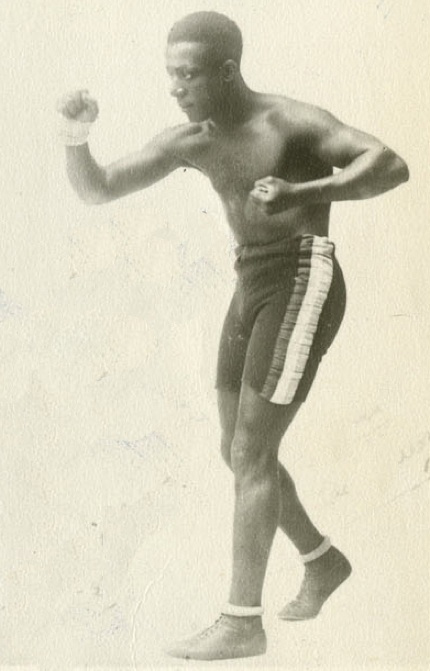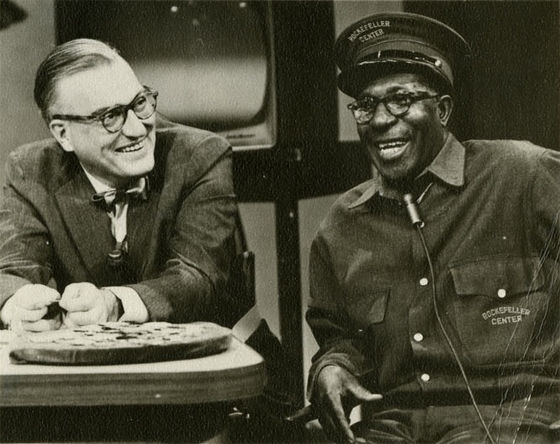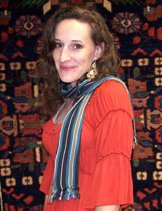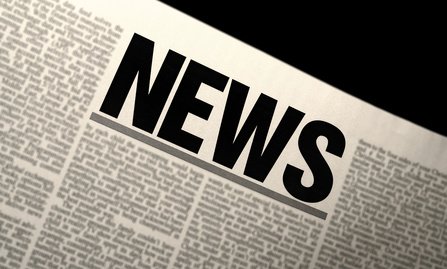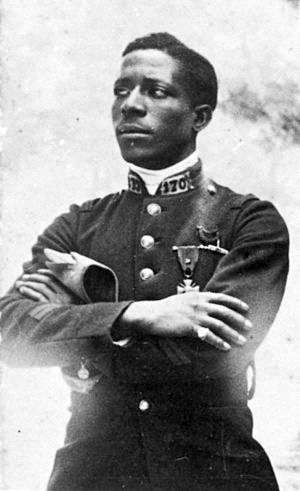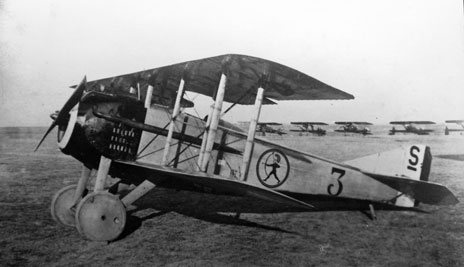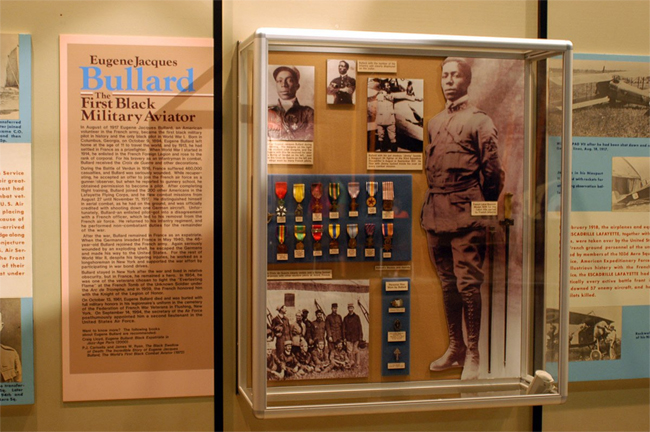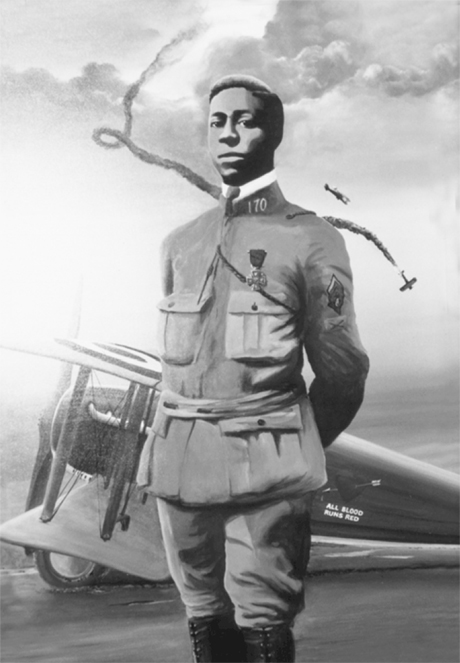EUGENE JACQUES BULLARD
Eugene Jacques Bullard. Extraordinary human. Extraordinary life. He excelled as a jockey, a boxer, a soldier, a pilot, a drummer and jazz musician, a nightclub proprietor, a single parent with 2 daughters, a spy, a longshoreman, a salesman, an elevator operator, a holder of medals for bravery, and much, much more. Here is his story…
BIRTH
Eugene Jacques Bullard was born on October 9, 1895, in Georgia to a father who was a former slave from Haiti and a mother who was a full- blooded Creek Indian. Young Eugene learned early about Southern bigotry. His father barely escaped a lynching and had to go into hiding.
Eugene's father had told him tales of a faraway land called France where ‘white people treated colored people as human beings.’ These tales inspired him. He began to hold fast to a dream of leaving the US south and getting, somehow, to France.
YOUTH
Bullard left his home permanently in 1906 after his mother died. He was only 11 years old! He wandered through the South for the next 6 years, living for a time with gypsies. He learned the art of horsemanship and worked as a jockey. Eventually, after traveling and working, he made his way to the Port of Norfolk, Virginia where he was able to stow away on a ship bound for Scotland. He would not see America again for thirty years!
In Glasgow, he got work as a lookout for gambling operators and was able to save enough money to get to England where he would be one country closer to his goal. In Liverpool, he engaged in hard labor, developing his muscles so he could turn to boxing.
BOXING
Eugene Jacques Bullard became part of a whole expat community of black boxers who had fled to Europe to find opportunities denied to them in the US. Some of these men were the finest fighters in history.
He began boxing regularly as a welterweight, which earned him enough money to get him to Paris for a bout. He won that bout and then dropped out of boxing. He had at last found his way home to France which, in his heart, was his adopted country.
SOLDIER
French Foreign Legion
In 1914, World War I had begun. Bullard felt that fighting for France was an honor. He joined the French Foreign Legion, training to fight in the 3rd Marching Division. The soldiers in the French Foreign Legion came from all walks of life, from all over the world, and were often running from various situations.
The 1820s and 30s were a turbulent time in France and Paris became the home of revolutionaries, refugees, criminals, and other undesirables. The French Foreign Legion originated as a way for Paris to rid itself of these most dangerous inhabitants. Rather than imprison or expel them, the French government instead pushed them into a special military unit created exclusively for foreigners. This unit was sent off to fight France’s colonial wars. If the men survived five years of fighting, they could return as French citizens.
Because of the rough nature of the recruits, strong discipline was required to keep them in line. Thus, the Legion soon earned a reputation for brutality in punishment as well as recklessness in battle. For the French military, these men could be sent into the most dangerous situations since they were considered to be ‘disposable.’
Battle of Somme
Eugene Jacques Bullard was sent to the front to the Battle of the Somme, fought by the armies of the British Empire and the French Third Republic against the German Empire. Some of the worst losses of World War I were experienced in this battle. Bullard’s 3rd Marching Division was disbanded after Somme.
170th Cavalry
Following a short respite, Bullard joined the 170th Cavalry. This group of individuals were known as ‘the Black Swallows.’ Folklore associated the swallow with misfortune. Bullard, who was known as ‘the Black Sparrow,’ also became known as ‘the Black Swallow of Death.’
Battle of Verdun
The 170th Cavalry was sent straight to Verdun with Eugene Bullard ranking as a Corporal. This would become one of the longest and worst battles in the history of the human race. Bullard led a machine-gun crew on the front line, fighting through a shrapnel wound to the face until he was finally sidelined by a near fatal wound to his thigh. For his valor at Verdun, Bullard was decorated with the Croix de Guerre, one of France’s highest military honors.
FIGHTER PILOT
Because of his war injuries, Bullard feared he could no longer be on the fighting front. He decided he wanted to learn how to fly so he could serve his adopted country as a fighter pilot. He began by working on repairing planes. Since he was already recognized as a hero, he was able to pull the necessary strings to enter flight school in 1916. He graduated in 1917 to become the first African-American fighter pilot in history!
Bullard flew a plane known as a SPAD VII C1. He had his plane painted with his personal slogan above a red heart with a dagger through it. That slogan in French translated roughly in English to ‘All Blood Runs Red.’ Bullard reportedly flew with his pet rhesus monkey, ‘Jimmy,’ tucked inside his coat on combat missions.
Eugene Jacques Bullard flew with honor and distinction until the Americans entered the war and a US Army Major with racist attitudes led to the end of Bullard’s career as a pilot. The French, however, continued to celebrate him. He ended his military career there with the Military Medal, Croix de Guerre, Volunteer Combat Cross, Medal for Military Wounded (twice), World War I Medal, Victory Medal, Voluntary Enlistment Medal, Battle of Verdun Medal, Battle of Somme Medal, and the American Volunteer with the French Army Medal.
Sadly, despite his acclaim in France, Bullard received virtually no recognition in America.
DRUMMER and JAZZ MUSICIAN
After the war, Eugene Jacques Bullard found himself in Paris in the 1920s. His war injuries prevented him from working in the boxing world as a sparring partner or professional boxer. Since the Jazz Age had begun, he learned to play the drums and became a jazz musician. He was able to find gigs frequently and was again able to save money. He met a biracial American blues singer, (Ada Beatrice Queen Victoria Louis Virginia Smith) known as ‘Bricktop’ for her red hair and ended up in a business partnership with her.
NIGHTCLUB PROPRIETOR
Together, Bullard and ‘Bricktop’ opened the Le Grand Duc, one of the most popular nightclubs in the city of Paris. This was not the only club he owned. Eventually he opened another, L’escradille. It was connected to a boxing gym so that patrons could party, then exercise, take a steam bath, get a massage, and start partying again!
Some of the greatest names in art and culture of the 1920s frequented his clubs. Some of these included Langston Hughes, one of the most important writers and thinkers of the 1920s, who served as a busboy and dishwasher. Arthur Wilson (‘Sam’ of Casablanca fame) was part of the house band. Charlie Chaplin, Gloria Swanson, Fatty Arbuckle, The Prince of Wales, Picasso, Hemingway (who wrote about it in ‘The Sun Also Rises’), Josephine Baker (American born French entertainer), F. Scott Fitzgerald and Zelda, and Cole Porter were there. Fred and Adele Astaire were known to come in and ‘tear up the floor.’ Bullard and Louis Armstrong became close when Armstrong stayed in Paris.
MARRIAGE and CHILDREN
Bullard married a Frenchwoman named Marcelle around the time he opened the Le Grand Duc. They had 2 children, both girls. For reasons not known, Marcelle ended up leaving him with the children. Running clubs and being a single parent was a challenge for Bullard, but he remained devoted to his daughters for the rest of his life.
SPY
In 1933, Hitler was appointed Chancellor of Germany. France created a counter-intelligence service and recruited Eugene Jacques Bullard to work with the Alsatian spy, Cleopatre ‘Kitty’ Terrier. Her father had been murdered by Germans in the disputed border region, instilling in her a lifelong hatred of German expansionism.
Kitty and Bullard worked as a team. He would serve tables and play dumb. This exploited German prejudices that would never allow them to suspect he was fluent in German. Kitty would flirt her way into privileged information. They were very successful in this work.
Unfortunately, wartime rationing, blackouts, and other austerity measures, made it very hard to keep his businesses running. Bullard tried hard. He took a wagon to markets at the end of the day for discounted goods and would throw them into a stew at his club. He would then feed everyone for free, also throwing in a free glass of wine and a pack of cigarettes. But things just kept getting worse and he had to close his businesses. Many were fleeing as the Nazis came storming in. But he would not run. He and Kitty continued to work in the Resistance until 1940, when the Nazis came marching into Paris.
He left his daughters in the care of Kitty who promised to do what was necessary to keep them safe, packed his gear, and headed for the frontlines again, despite his age and multiple injuries, and rejoined the Legion to find his old unit. Unfortunately, he found that his old unit had been destroyed. When he returned to Paris, he couldn’t enter because it had become completely overrun.
When Bullard heard rumors that the French 51st was holding out at Orleans, he headed there, starting off on foot. He found that his lieutenant from the last war was the commander of the 51st and he was once again in charge of a machine-gun crew fighting the Germans. He fought with his usual bravery but a shell that killed 11 men threw him 40 feet and cracked a vertebrae, ending his fighting days for good.
At a military hospital, he learned that if he headed for Bordeaux and into Spain, (which had maintained official neutrality in the war), he would find Allied rescue efforts on Spanish soil who could help him get to the United States. He received his first passport, was put on a Navy ship, and finally returned to the United States to Manhattan.
LONGSHOREMAN, SALESMAN, ELEVATOR OPERATOR
In New York City, Eugene Jacques Bullard had to start his life from scratch working odd jobs. He was able to contact Kitty who had kept his daughters safe and they were able to come to the US to be with their father. While in Manhattan, he became involved in Free French groups working to support General de Gaulle, who was head of the Free French government in exile at the time.
Times were hard in Manhattan for Bullard. His old friend Louis Armstrong helped him by hiring him as a tour manager and occasional drummer. He even tried to reopen his club and gym in Paris. He had to give up because the postwar situation was hopelessly complicated.
In 1959, he was made a chevalier (knight) of France via the French Embassy in New York City. This was while he was working as an elevator operator at 10 Rockefeller Plaza. One day, Dave Garroway, the host of The Today Show entered the elevator and asked him about the medal he was wearing. He had Bullard’s history checked out and found that the elevator man was not only the first African- American fighter pilot in history but much, much more.
Bullard was invited to appear on The Today Show, which led to other appearances and speaking engagements. At last, in parts of America, his heroism was finally recognized.
RETURN TO THE SOUTH
His one return visit to Georgia was not a happy one. His family had been scattered and one brother had been lynched. He never returned to the South again and lived out the rest of his life in New York City.
EUGENE JACQUES BULLARD
FINAL HONOR
In 1960, General Charles de Gaulle, came to visit President Eisenhower. After giving speeches at City Hall and the Waldorf Astoria, he went to the Seventh Regiment Armory. Five thousand French were there and Eugene Jacques Bullard’s presence had been requested.
After his speech, de Gaulle looked into the crowd searching for someone. The general then left the podium and headed into the audience to find a lone Black man, his chest gleaming with medals. The man stood at attention and saluted. De Gaulle returned the salute, then put his hand out and pulled the old soldier into a massive hug. ‘All our country is in your debt,’ said the general. Bullard, whose journey through life had begun as a stowaway, sure only that he belonged in France, could only answer, ‘Merci, mon general. Merci beaucoup.’
DEATH
On October 12th, 1961, just 3 days after his 66th birthday, the Black Sparrow, Eugene Jacques Bullard, the old horseman, boxer, soldier, pilot, spy, club-owner, musician, and father died. He was buried in the Federation of French War Veterans cemetery in Flushing, N.Y. As per his request, he was wearing the uniform of a French Foreign Legionnaire, and his casket was draped in the French tricolor.
Thirty-three years later, President Bill Clinton promoted Bullard to the rank of second lieutenant in the U.S. Air Force.
"The Cleanest Clean You've Ever Seen."
by
ABC Oriental Rug & Carpet Cleaning Co.
130 Cecil Malone Drive Ithaca, NY 14850
607-272-1566
